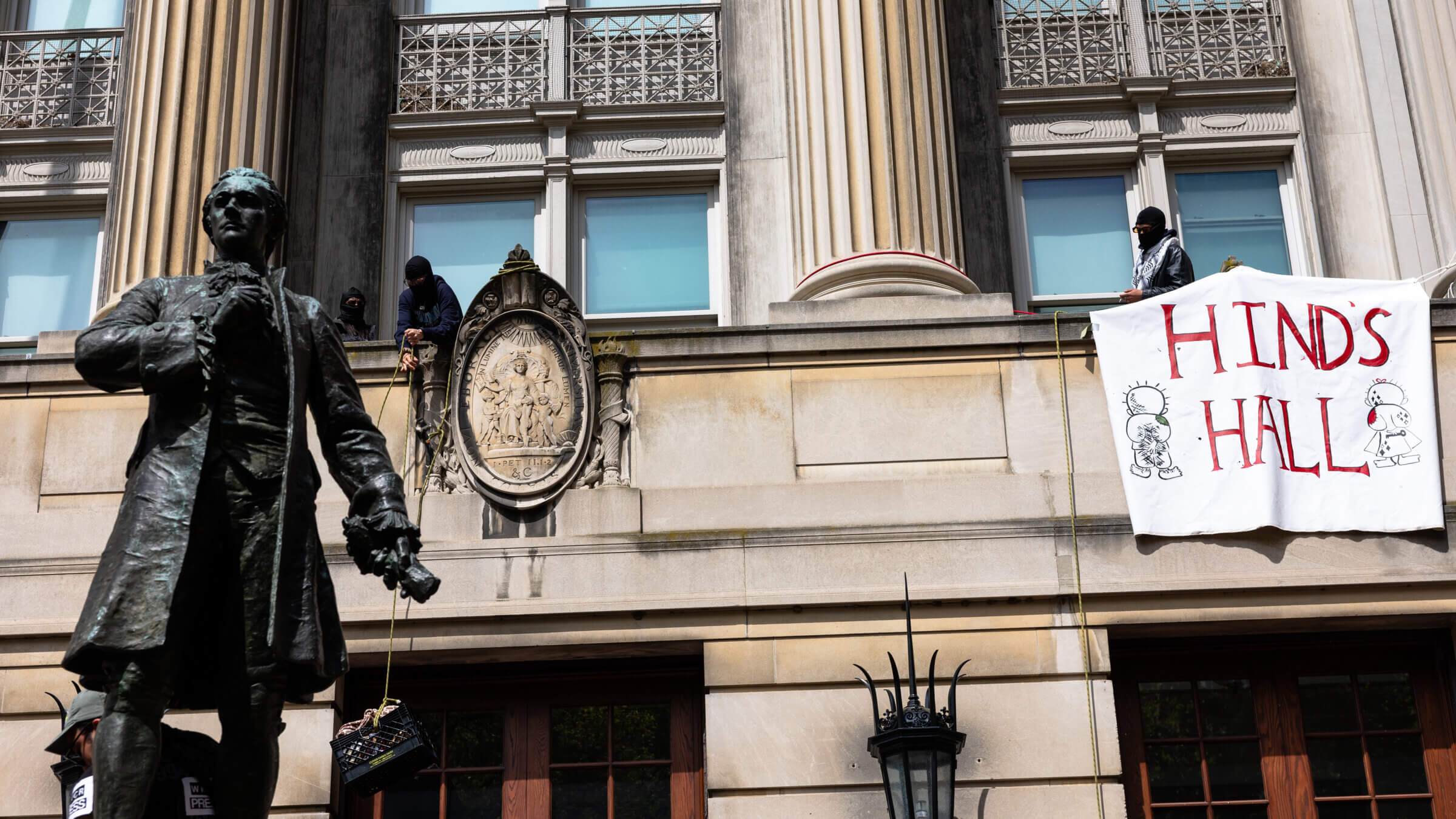Columbia’s president releases a video addressing decision to call police to campus
University President Nemat Shafik had kept a low profile in the days since she asked New York City police to retake a building from student protesters

A pro-Palestinian protestor lifts a milk crate with supplies while occupying Hamilton Hall at Columbia University in New York, US, on Tuesday, April 30, 2024. Photo by Michael M. Santiago/Bloomberg via Getty Images
Under fire from all sides, Columbia University President Nemat Shafik said Friday that administrators had negotiated patiently for eight days and made “a sincere and good offer” to pro-Palestine protesters before her controversial decision to bring the New York Police Department onto campus for the second time in two weeks to remove them from Hamilton Hall. In a three-minute video message posted on the X platform, Shafik, who goes by the first name Minouche, referenced her Egyptian Muslim roots in a plea for students to embrace “civil discourse.”
A message from President Shafik. pic.twitter.com/zd8i2DE4wp
— Columbia University (@Columbia) May 3, 2024
The video, shot on campus, comes three days after CNN broadcast live the late-night police raid of Hamilton Hall, which students protesting Israel’s military campaign in Gaza had occupied for 17 hours. Facing widespread criticism, Shafik had kept a low profile this week; in the video, she addresses students directly.
“These past two weeks have been among the most difficult in Colombia’s history,” she said in the video. “The turmoil and tension, division and disruption have impacted the entire community. You, our students, have paid an especially high price. You lost your final days in the classroom and residence halls. For those of you who are seniors, you’re finishing college the way you started online.”
The police arrested more than 100 protesters overnight Tuesday, about 70% of whom were affiliated with Columbia. The university also removed from its South Lawn an encampment including dozens of tents erected by students who said they would not voluntarily leave until Columbia disinvested its holdings in Israel.
The encampment, which police first cleared on April 18, arresting scores for trespassing, inspired students at dozens of other colleges across the nation to stage similar protest camps in the final days of the spring semester. The protests have scrambled plans for final exams and commencements in some places. Other university leaders have also called in police to clear protesters and make arrests, with chaotic scenes of law enforcement facing off with students beaming across the nation and the world.
At some schools, administrators have brokered deals with students to remove their tents in exchange for concessions.
Shafik is facing calls to resign from those who support the protests, but also from critics on the right, including House Speaker Mike Johnson, who accused her of tolerating antisemitism at Columbia. Universities have grappled with spikes in anti-Zionism and antisemitism since Hamas attacked Israel on Oct. 7 and Israel responded with a punishing invasion and bombing of Gaza.
Some though, including New York City Mayor Eric Adams, have praised Shafik for drawing a hard line after the occupation of Hamilton Hall.
In the video, she described the takeover of that building as “a violent act that put our students at risk as well as putting the protesters at risk.” Afterward, she said, “I walked through the building and saw the damage which was distressing.”
She also drew on her heritage to make the case for more civil engagement on campus.
“As many of you know, I was born in the Middle East. I grew up in a Muslim family with many Jewish and Christian friends,” she said. “I spent two decades working in international organizations with people from every nationality and religion in the world. Where if you can’t bridge divides and see the other side’s point of view, you can’t get anything done. I learned from that experience that people can disagree and still make progress.”
On X, the platform formerly called Twitter, reaction to the video was swift and harsh from both those who support and those who disdain the protesters.













